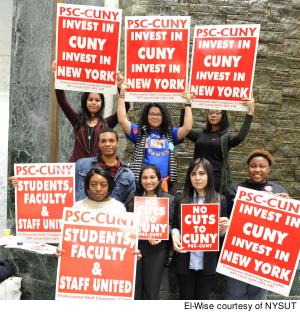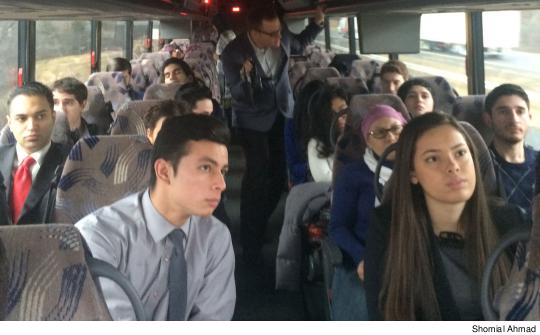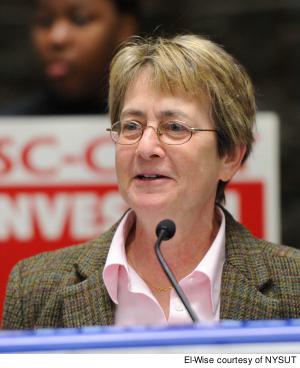 |
In the gray of early morning on February 25, more than 200 CUNY students along with PSC members boarded buses to Albany to take part in Higher Education Action Day, a coalition effort organized by the PSC, CUNY’s University Student Senate, New York Public Interest Research Group, New York State United Teachers (NYSUT) and United University Professions (UUP). The timing was deliberate: By the end of March, state lawmakers are expected to put the finishing touches on a budget with serious implications for the health of CUNY colleges. Students were primed to flood legislative offices with demands to call off yet another proposed tuition hike at senior colleges, as well as Governor Andrew Cuomo’s planned $485 million cut to New York State’s allocation for CUNY’s senior colleges.
INCREASING TUITION
Iman Abbas, a Hunter College master’s student in nutrition, was up at 4:30 am in order to make the 6:30 am boarding call for the bus that waited near 68th Street on Park Avenue. Abbas is accustomed to skimping on sleep, having paid for her undergraduate education at Hunter College by working full-time, and making a one-and-a-half-hour daily trek from her home in Woodside, Queens, to her 8:00 am job as an accounting assistant at a private school in Sunset Park, Brooklyn. After work at night, she attended classes in Manhattan. On the weekends, she studied.
 |
“I understand the struggle to finance your own education,” Abbas said, while the bus made its way north along Interstate 87. “I just feel like people [shouldn’t] have to go through that. I believe education is a right.”
Since 2011, the price tag of that right has steadily increased thanks to SUNY 2020, a measure passed by the state legislature that allows CUNY and SUNY to increase tuition by $300 a year. Since the law was enacted, CUNY tuition has increased by a total of $1,500 — a more than 30 percent increase at senior colleges and a 45 percent spike at community colleges. While the law will sunset this July, the CUNY Board of Trustees overwhelmingly approved a budget request that would allow for another tuition hike at the university’s senior colleges in the coming year (see the December 2015 Clarion, “PSC and students resist tuition hikes”). Despite the law’s intent that tuition increases would fund academic programs and services, CUNY students have not seen the improvements the increases were promised to support. Instead, increased tuition revenues paid for unfunded mandatory costs.
Sabrina Persaud’s family history tells the story of the state’s disinvestment in CUNY. A sophomore at Hunter College, Persaud’s tuition is currently $6,330 per year, the annual cost for full-time tuition at CUNY’s senior colleges. (Community college tuition for full-time students is $4,800 per year.) But when Persaud’s brother attended LaGuardia Community College and Lehman College five or so years ago, his tuition was significantly less than what CUNY students pay now. In the 1980s, when her mother attended Borough of Manhattan Community College, she paid $90 for three credits. “That’d be $450 for five classes,” Persaud noted, bringing her mother’s yearly tuition bill to $900.
Initially, Persaud was “on the fence” about making the Albany trip, she said, given her full course schedule on Thursdays. But when she realized that various obligations would keep her friends from joining the group, she said she felt the need to represent their concerns in addition to her own. She talked to her friends about their own challenges and took notes on facts and figures. Their personal stories, Persaud said, were “in her head” as she gazed through the bus window. One friend, she said, works three jobs to pay for her tuition.
CONNECTING WITH LAWMAKERS
Rory O’Brien, a junior majoring in history at Hunter College, had a dual purpose in his first trip to Albany. “I’m here because I’m concerned about tuition and CUNY,” O’Brien said. “And,” he added, “I want to understand how basic interaction works with lawmakers and their constituents.” Prior to the trip, he explained, he looked over the biographies of state lawmakers, studied budget numbers and read up on recent developments on Politico New York.
Since 2008, CUNY and SUNY have lost $1.5 billion in state funding. For the past six years, CUNY faculty and staff have been working without a raise, and a significant hurdle to reaching a fair contract settlement is the lack of adequate CUNY funding in the state budget. In his executive budget, released in January, Cuomo included $240 million for back pay in any contract settlement, even as he cut funding for CUNY’s senior colleges by nearly a half-billion dollars. (The budget requires final approval by the state legislature.) In December, the governor vetoed a “maintenance of effort” bill that would have funded mandatory increases at CUNY, such as utility costs and raises for university employees.
Danielle Lucchese, in her final year in a disability studies master’s program at the School of Professional Studies, planned to press the human connection in her visits to lawmakers. “One of the things I realize is that these politicians are people, too,” she said. “Yeah, they have power, but they have family and friends who would be affected by these policies.” While she will have graduated before any successful lobbying yields results, Lucchese said she was making the case for CUNY funding on behalf of her friends, her cousins and students at other campuses. It’s important to “be gutsy,” she added, and “say what you have to say.”
 |
After a two-and-a-half-hour bus ride, Lucchese joined hundreds of other students in the State’s Legislative Office Building to listen to other advocates press the importance of their cause. More than 400 CUNY and SUNY students turned out; they would later break into groups that, in total, would meet with around 100 individual lawmakers and their staffs. Holding signs that read “Freeze Tuition” and “No Cuts to CUNY,” students joined PSC officers and members in chants led by PSC President Barbara Bowen.
THE TIME IS NOW
“Students, faculty, staff unite, same struggle, same fight,” they cried. “You have power — use that today,” Bowen told the crowd. “Speak to the legislators. Yes, you’ll be informed. And yes, you’ll be rigorous, but you’ll also be strong.”
Deborah Glick, chair of the New York State Assembly’s Higher Education Committee, welcomed the students to the capital.
“Public higher education is the future of the state, and we need to invest in our future,” Glick said, stressing the looming deadline for finalizing the budget. “The rubber’s meeting the road right now.”

